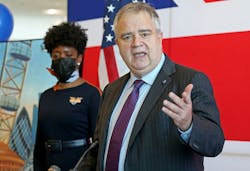JetBlue Announces $3.8 Billion Deal for Spirit Airlines
JetBlue Airways will buy fellow discount air service Spirit Airlines in a deal announced Thursday.
“We are excited to deliver this compelling combination that turbocharges our strategic growth, enabling JetBlue to bring our unique blend of low fares and exceptional service to more customers, on more routes,” JetBlue CEO Robin Hayes said in a release. “We look forward to welcoming Spirit’s outstanding Team Members to JetBlue and together creating a customer-centric, fifth-largest carrier in the United States.”
The cash offer was made at cost of $33.50 per share, the company announced, for “an aggregate fully diluted equity value of $3.8 billion and an adjusted enterprise value of $7.6 billion.”
That represents a 50-cent per share increase over the offer made by JetBlue to buy their competitor in April.
Hayes told reporters then such a merger would result in the so-called “JetBlue” effect occurring more broadly, lowering the cost of travel for customers regardless of airline choice. Spirit’s CEO seems to be on the same page.
“We are thrilled to unite with JetBlue through our improved agreement to create the most compelling national low-fare challenger to the dominant U.S. carriers, and we look forward to working with JetBlue to complete the transaction. Bringing our two airlines together will be a game changer,” Ted Christie, president and CEO of Spirit, said in a release.
Research has indicated that low cost carriers entrance into a market causes other carriers fares to lower as a result. This was dubbed the “Southwest Effect” by the Department of Transportation as early as 1993, but has been called the “JetBlue Effect” where that carrier has entered markets.
The airline industry went through a period of deregulation starting in 1978. Before that there were over 400 domestic air carriers. Four carriers – American, Southwest, Delta, and United – now share 80% of the domestic market.
If the plan JetBlue and Spirit’s boards came up with goes through, the airlines would become the fifth largest in the country.
That is, of course, provided that federal regulators allow the merger, which isn’t a certainty.
In September of 2021 a plan between JetBlue and American Airlines to coordinate some service was met with an antitrust lawsuit filed by the Justice Department, which alleged the partnership between the airlines would reduce competition and drive up prices.
In a March letter to President Biden’s administration, U.S. Senators Elizabeth Warren and Bernie Sanders, among others, urged the Justice Department to carefully consider whether a $6.6 billion merger between Spirit and Frontier Airlines would be good for consumers. That merger would theoretically have made Frontier the fifth largest domestic carrier.
“Even as the fifth-largest carrier, JetBlue, with Spirit, would have only 9% market share, compared to 13% for the fourth-largest airline and 23% for the largest carrier. After the combination and with its committed upfront divestitures, the largest seat share a combined JetBlue-Spirit will have in any of its largest metro areas is 40%, compared to the 57-91% share legacy carriers have in their largest metro areas,” JetBlue said in a release.
“The four largest carriers control more than 80% of the market. Creating a low-fare, customer-centric challenger with size and scale is the best opportunity to disrupt legacy carrier pricing in the current landscape,” the company said.
©2022 MediaNews Group, Inc. Visit at bostonherald.com. Distributed by Tribune Content Agency, LLC.
